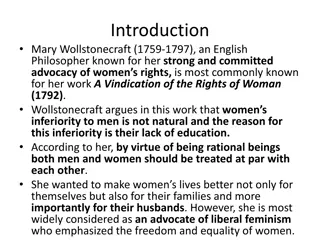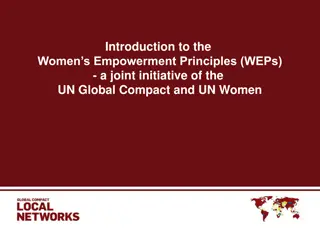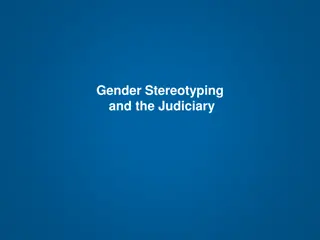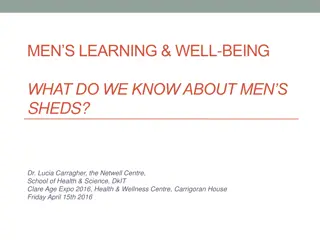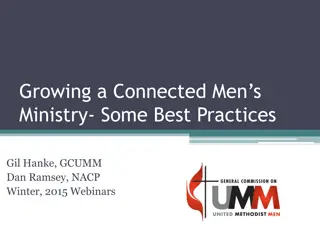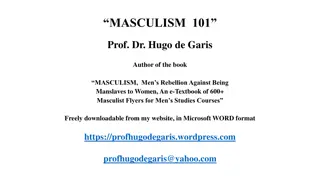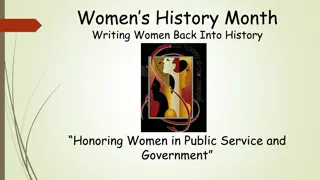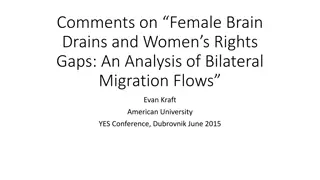May Women Teach Men?
Women teaching men is a topic of discussion in religious contexts, particularly based on the interpretation of 1 Timothy 2:12. While some believe it restricts women from teaching men in certain settings, others argue for a broader interpretation encompassing various forms of instruction and leadership. This text explores different perspectives on women's role in teaching men within the context of 1 Timothy 2:8-15, examining historical views and contemporary applications.
Download Presentation

Please find below an Image/Link to download the presentation.
The content on the website is provided AS IS for your information and personal use only. It may not be sold, licensed, or shared on other websites without obtaining consent from the author.If you encounter any issues during the download, it is possible that the publisher has removed the file from their server.
You are allowed to download the files provided on this website for personal or commercial use, subject to the condition that they are used lawfully. All files are the property of their respective owners.
The content on the website is provided AS IS for your information and personal use only. It may not be sold, licensed, or shared on other websites without obtaining consent from the author.
E N D
Presentation Transcript
May Women Teach Men? 1 Timothy 2:8-15
May Women Teach Men? Actually, it seems like a rather strange question, doesn t it? Women teach men in Universities and research institutions. Women teach men in seminars and webinars. Women teach men in political and health institutions and contexts. Women teach men in their homes and other family settings. Women teach men in both word and deed (example) in daily life. Women teach men through singing hymns to each other. Women teach men through books and videos, including writing/talking about God. So, why is this a question at all? There is only one text that seemingly restricts women: 1 Timothy 2:12. Typically, this is restricted to when the saints are gathered for praise, prayer, and edification and restricted to a particular topic: God (and the Bible). It is also linked to what it means for a woman to have authority over a man.
The Principle My operative principle for many years was this: 1 Timothy 2:12 prohibits a woman from exercising authority over a man. What constitutes exercising authority over a man? Where does it apply? Any speaking function in an assembly or a specific kind of speaking? Any form of leadership in an assembly or a specific kind of leadership? Any form of leadership in a small group or Bible class? Teaching or leading a prayer in a small group or Bible class? Audiblizing a thanksgiving or petition in a chain prayer? Chairing a congregational committee with men on it? Voting in a business or congregational meeting? Leading a particular ministry in the church where men are involved? A pre-teen girl speaking to a room of men, women, and children? Given this principle, one theologian identified nine specific governing and ten specific teaching activities that are restricted to men. That entails a considerable number of inferences as exercise authority is applied to congregational life.
Teaching Men A common application of 1 Timothy 2:12--women women may not teach men in the public assembly, Bible classes, or small groups. But this has not always been so among churches of Christ. David Lipscomb, Gospel Advocate (25 Aug 1910): 968. At the Sunday school the woman does not usurp the place of a man in teaching all present. Only a few who wish to be taught or to teach attend. The woman does not teach before all who are present. She takes her class, old or young, to themselves and teaches them. . . Suppose a number of men, women, or children, or all combined, were willing to study the Bible, and a woman was the best teacher they could find, and they were to meet at her house to get her help, and she was to teach them in studying the Bible. . . Suppose it were more convenient to meet at the meetinghouse and study the Bible at an hour not used for the regular meetings, would this be sin?
1 Timothy 2:8-15 (NRSV) I desire, then, that in every place (literally?) the men (husbands) should pray, lifting up holy hands (always?) without anger or argument; also that the women (wives? Which women?) should dress themselves modestly and decently in suitable clothing (means what today?), not with their hair braided, or with gold, pearls, or expensive clothes (still forbidden?), but with good works, as is proper for women (wives?) who profess reverence for God. Let a woman (wife?) learn in silence (quietness?) with full submission (to whom or what?). I permit no woman (wife? a specific woman?) to teach (meaning?) or to have authority (meaning?) over a man (husband?); she is to keep silent (quiet?). For (rationale?) Adam was formed first, then Eve; and (rationale based on creation and fall?) Adam was not deceived, but the woman was deceived (why note the difference in deception?) and became a transgressor. Yet she (who?) will be saved (in what sense?) through childbearing (meaning?), provided they (who?) continue in faith and love and holiness, with modesty(means what today?).
Questions Abound Are only men to pray? Are women only to dress modestly? Are we talking about men and women in general or husbands and wives? Is lifting holy hands required? Which is required: lifting or holy? Are we talking about husbands/wives or men and women in general? What does in every place mean? Assembly, home, private, public? May women wear gold and pearls today? Did all female believers dress this way or only some? What does quiet/silent mean in 2:11-12? Is it similar to or the same as 2:2? Does the present tense ( I do not permit ) convey the sense for now or at the moment. To whom or what must women submit? Why is it important for a woman to learn? To what does teach refer and what does it mean? How are men defined in 2:12? Why does Paul appeal to Adam and Eve? What does childbearing mean, and how are women saved by it? Who is the she and who are the they in 2:15?
Purpose of 1 Timothy 1 Timothy 1:3-4, 18: instruct certain people not to teach any different doctrine (heterodidaskalein), and not to occupy themselves with myths and endless genealogies that promote speculations rather than the divine training that is known by faith. . . . so that you may fight the good fight, having faith and a good conscience. 1 Timothy 6:2b-4a, 12: Teach and urge these duties. Whoever teaches otherwise (heterodidaskalei) and does not agree with the sound words of our Lord Jesus Christ and the teaching that is in accordance with godliness (eusebeia), is conceited, understanding nothing, and has a morbid craving for controversy and for disputes about words. . . Fight the good fight of faith.
1 Timothy 2:8-15: Context Fight the good fight, Timothy (1:18-20). Therefore, I urge prayer. . . (2:1-7). Therefore, I want men likewise women to (2:8-15).
Women and False Teaching 1 Timothy 5-6 1 Timothy 2 Encouraged to godliness (5:3) Some learned to be idle (5:13) Professed false knowledge (6:20-21) Wealth and Love of Money (6:9-10) Meddling busybodies, talking nonsense (5:13) Idle, no good works (5:9, 13) Saying what they should not say (5:13) Some had turned to Satan (5:15) Encouraged to godliness (2:10) Women should learn (2:11) Should profess godliness (2:10) Wearing wealthy accessories (2:9) Learn in quietness (2:11) Devoted to good works (2:10) Not permitted to teach (2:12) The serpent deceived Eve (2:14)
2 Timothy 2:16-18, 3:2-8 Avoid profane chatter, for it will lead people (anthr poi) into more and more ungodliiness, and their talk will spread like gangrene. Among them are Hymenaeus and Philetus, who have swerved from the truth by claiming that the resurrection has already taken place. They are upsetting the faith of some (tines). . . For people will be lovers of themselves, lovers of money, boasters, arrogant, abusive, disobedient to their parents, ungrateful, unholy, inhuman, implacable, slanderers, profligates, brutes, haters of good, treacherous, reckless, swollen with conceit, lovers of pleasure rather than lovers of God, holding to the outward form of godliness but denying its power. Avoid them! For among them are those who make their way into households and captivate silly women, overwhelmed by their sins and swayed by all kinds of desires, who are always being instructed and can never arrive at a knowledge of the truth. As Jannes and Jambres opposed Moses, so these people (anthr poi), of corrupt mind and counterfeit faith, also oppose the truth.
1 Timothy 2:12 KJV: But I suffer not a woman to teach, nor to usurp authority over the man, but to be in silence. ASV: But I permit not a woman to teach, nor to have dominion over a man, but to be in quietness. NRSV: I permit no woman to teach or to have authority over a man; she is to keep silent. ESV: I do not permit a woman to teach or to exercise authority over a man; rather, she is to remain quiet. NIV (2011): I do not permit a woman to teach or to assume authority over a man; she must be quiet CEB: I don t allow a wife to teach or to control her husband. Instead, she should be a quiet listener. Message: I don t let women take over and tell the men what to do. They should study to be quiet and obedient along with everyone else.
To Whom Does this Apply? I do not permit a woman to teach or to have authority over a man; rather, she is to remain quiet. How is man defined ? Any baptized male, including ten year old children? Any male in the church or its assembly? Any male at all, even in the public square? Husbands only? How is quiet defined? silence total silence? silence silenced from teaching? quiet a gentle, unobtrusive demeanor (what it means in 1 Timothy 2:2): [pray] that we may lead a peaceful and quiet life, godly and dignified in every way
What Does Teach Mean? I do not permit a woman to teach or to have authority over a man; rather, she is to remain quiet. To what does it refer? to any kind of teaching (e.g., singing or a teaching in 1 Cor. 14:26), a specific kind of teaching (e.g, preaching or authoritative teaching ), a style of teaching (e.g., domineering or abusive), or the content of teaching (e.g., as in 1 Tim. 1:3: to teach any different doctrine ) How does the phrase have authority contextualize the kind of teaching envisioned? If exercise authority is a negative idea, then teach is probably also a negative idea either in the sense of style or content. In many ways, the point of teach depends on how one understands authority in 2:12.
What Does Authority Mean? I do not permit a woman to teach or to have authority over a man; rather, she is to remain quiet. 1 Timothy 2:12 Does it refer to the exercise of legitimate authority (e,g., elders) within the community? the self-assertion of domineering or overpowering influence within the community? The word is authente Only occurs here in the NT. It is rare and negative in every prior Greek usage (only eight known times before the fourth century AD). It is not Paul s normal word for legitimate authority (exousia) or other characterizations in 1-2 Timothy & Titus (managing or ruling; 1 Tim 3:4-5, 12; 5:17). Authente most likely refers to an abusive, overpowering, domineering, and self- assertive action (KJV: usurp authority ). Paul wanted to stop some women from saying what they should not (5:13), and thus he did not permit these women to teach and overpower or dominate men in order to persuade them to participate in false teachings and/or practices.
Examples of the Root (Authent) Wisdom of Solomon 12:4-6 (first century B.C.): You hated for their detestable practices, their works of sorcery and unholy rites, their merciless slaughter of children, and their sacrificial feasting on human flesh and blood. These initiates from the midst of a heathen cult, these parents who murder (authentas) helpless lives, you willed to destroy by the hands of our ancestors. Ptolemy, Tetrabiblos, 3.13.10 (second century AD): Saturn, therefore, once he has taken sole house-control (oikodespoteia) of the soul and has gained mastery (authenteo) . . . of Mercury and the moon . . . makes people lovers of the body. Moeris Atticista, Lexicon Atticum (second century AD): to have independent jurisdiction or self determination, or to act on one s own.
What does 1 Timothy 2:12 Mean? The authority named in 1 Timothy 2:12 is a self-assertive, abusive, or overpowering influence. It does not have a positive meaning. The KJV was correct: usurp authority. It means to assume authority in an autonomous and controlling way in contrast to any mutual submission. Therefore, the kind of authority forbidden is not the sort of authority that is legitimate within the believing community such as God gifts for leadership in a community (e.g., elders, evangelists, etc.). Rather, women are not permitted to teach/lead in such a way that they assert control and overwhelm others through their assumption of an abusive authority. Apparently, some women who dressed as described in 2:9 were asserting authority and seeking to persuade some men.
1 Timothy 2:13-15 For Adam was formed first, then Eve; and Adam was not deceived, but the woman was deceived and became a transgressor. Yet she will be saved through childbearing, provided they continue in faith and love and holiness, with modesty. The text seems to follow this story: formed (creation) and became a transgressor (fall), yet saved (redemption)
Pauls Rationale? For Adam was formed first, then Eve; and Adam was not deceived, but the woman was deceived and became a transgressor. 1 Timothy 2:13-14 What is Paul s rationale? Its meaning is implicit rather than explicit. Hierarchy: Is Paul grounding his instruction in the primogeniture status of Adam in relation to Eve such that there is a ranking of authority between men and women? Typology: Is Paul grounding his instruction in the story of Eve s own deception as an type of what is happening in the Ephesian church? Which is the better reading? Sequential chronology (story-formed) or primogeniture (rank as firstborn)? Primogeniture is never invoked in Genesis 2; rather the opposite obtains in Genesis 1. Primogeniture is reversed in Genesis (Isaac, Jacob, Judah, Ephraim). Primogeniture entails rank/authority in all aspects of life, including public life. Primogeniture in Israel entails double honor and inheritance in Israel.
Pauls Rationale Deceived Women For Adam was formed first, then Eve; and Adam was not deceived, but the woman was deceived and became a transgressor. 1 Timothy 2:13-14 first then probably has more of a narrative or sequential intent than a ranking (for example, 1 Timothy 3:10 first be tested, then ) Here Eve is a typology for deceived people as in 2 Corinthians 11:3. as the serpent deceived Eve by his cunning, your thoughts will be led astray from a sincere and pure devotion to Christ. Deceived is the key word the only word repeated in the text. The text reflects the narrative movement of Genesis 2-3 from creation to sin to redemption. This provides a natural reading and framework if we can create space in our traditioned minds to hear an alternative. The biblical narrative provides the background information that renders the rationale more explicit.
Paul Tells the Story Creation 1. Adam was first formed (1 Timothy 2:13). (The man was formed from the ground, Genesis 2:7.) (The woman was formed from the man, Genesis 2:21-22.) 2. Adam was not deceived (1 Timothy 2:14). (He knew the command of God, Genesis 2:15-17.) (But he listened to Eve, Genesis 3:17.) 3. Eve was deceived (1 Timothy 2:14). (The serpent tricked her, Genesis 3:13.) 4. Eve became a transgressor (1 Timothy 2:14). (She ate the fruit, Genesis 3:6.) Redemption 5. She will be saved through the childbearing (1 Timothy 2:15). (God promised a seed to crush the serpent, Genesis 3:15.) 6. If they continue in faith and love and holiness, with modesty (2:15). Fall
Whats the Point? False Teaching Paul is responding to a situation in Ephesus where women had been deceived by false teachers, and these women were promoting ungodliness through their dress, actions, and words (teachings). Though Paul had already dealt with many, if not all, the leading male false teachers (1 Timothy 1:20--Hymenaeus and Alexander, whom he had turned over to Satan ), their influence was still present among some women in Ephesus.
Whats the Point? Deceived Women These deceived women were going about saying what they should not be saying. Consequently, Paul wants them to reform so that their practices and words will reflect godliness. This means these women must learn in quietness and submit to the mystery of godliness (1 Timothy 3:16), which is the gospel of Jesus Christ. They cannot teach until they learn, but once they learn, they may teach (2 Timothy 2:2). These women are not permitted to teach because they are practitioners and advocates of ungodliness who were persuading men to join their cause.
2 Timothy 2:2 NIV (2011): And the things you have heard me say in the presence of many witnesses entrust to reliable people who will also be qualified to teach others. ESV: and what you have heard from me in the presence of many witnesses entrust to faithful men, who will be able to teach others also. Faithful people or faithful men? Whereas man in 1 Timothy 2:8, 12 is aner (husband, man), the word here is anthr pois (people or humans), and this includes women.
Applying the Traditional Understanding Does this apply only to the public assembly, Bible classes, home devotionals or anywhere people pray? Does it apply in the public square? May women have authority over men in education, politics, or health care facilities? May women wear gold and pearls while professing godliness? Does have authority (if positive in meaning) apply to announcements, reporting on a mission trip, passing communion trays, offering communion meditations, singing a solo in the assembly, etc? How does one discern what pracice has authority and what practice does not? Or, does have authority (if positive in meaning) refer only to preachers (evangelists) and elders? Using the principle of having authority, it is difficult if not practically impossible to provide a coherent and consistent application. Is the story of God about women really that complicated and dependent upon our inferences and projections about what it means to have authority over men ?
My Application Wherever it is the case that men or women are practicing and teaching ungodliness, they are not permitted to teach and persuade (or dominate) the body of Christ. While the men in Ephesus were engaged in angry discussions, some women were leading some men into the clutches of Satan. These women must learn in quiet submission to the mystery of godliness because they had been deceived by false teaching. Once they have learned the truth, then they are encouraged to teach others the way of Jesus as well.
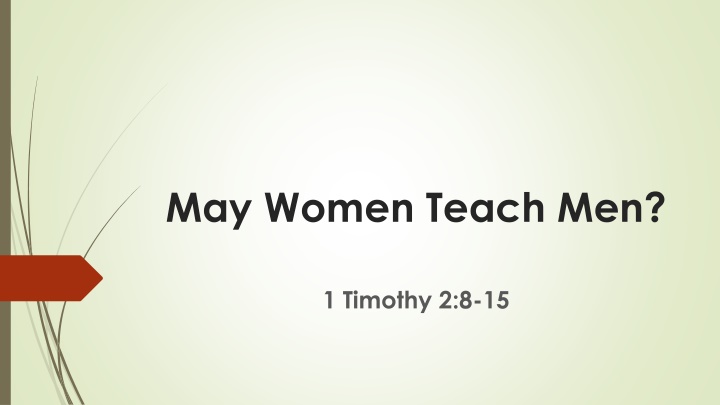

![❤[PDF]⚡ Escaping from Eden: Does Genesis Teach that the Human Race was Created](/thumb/21697/pdf-escaping-from-eden-does-genesis-teach-that-the-human-race-was-created.jpg)





